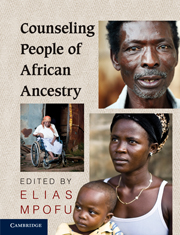Book contents
- Frontmatter
- Contents
- Contributors
- About the Editor
- Editorial Board
- Foreword
- Preface
- Acknowledgments
- PART 1 FOUNDATIONS OF COUNSELING IN AFRICAN SETTINGS
- PART 2 CONTEXTS OF COUNSELING
- 7 School Counseling
- 8 Counseling Students at Tertiary Institutions
- 9 Family Therapy within the African Context
- 10 Pastoral Care and Counseling
- 11 African Refugees: Challenges and Prospects of Resettlement Programs
- 12 Counseling Orphans and Vulnerable Children in Africa
- 13 Diversity Counseling with African Americans
- 14 Resolving Conflict in Africa: In Search of Sustainable Peace
- PART 3 COUNSELING APPLICATIONS
- PART 4 THE FUTURE OF COUNSELING IN AFRICAN HERITAGE SETTINGS
- Counseling People of African Ancestry Multiple Choice Answers
- Index
8 - Counseling Students at Tertiary Institutions
Published online by Cambridge University Press: 05 August 2011
- Frontmatter
- Contents
- Contributors
- About the Editor
- Editorial Board
- Foreword
- Preface
- Acknowledgments
- PART 1 FOUNDATIONS OF COUNSELING IN AFRICAN SETTINGS
- PART 2 CONTEXTS OF COUNSELING
- 7 School Counseling
- 8 Counseling Students at Tertiary Institutions
- 9 Family Therapy within the African Context
- 10 Pastoral Care and Counseling
- 11 African Refugees: Challenges and Prospects of Resettlement Programs
- 12 Counseling Orphans and Vulnerable Children in Africa
- 13 Diversity Counseling with African Americans
- 14 Resolving Conflict in Africa: In Search of Sustainable Peace
- PART 3 COUNSELING APPLICATIONS
- PART 4 THE FUTURE OF COUNSELING IN AFRICAN HERITAGE SETTINGS
- Counseling People of African Ancestry Multiple Choice Answers
- Index
Summary
OVERVIEW. This chapter provides information concerning the counseling of students within the context of tertiary institutions, such as universities and other institutions of higher education. The chapter explores the counseling needs of African students or students of African heritage. Practical examples are taken from Zimbabwe, South Africa, and Namibia to illustrate various points. Furthermore, the chapter explores who is available at tertiary institutions to provide counseling to students and whether or not this assistance is suited for their presenting problems.
LEARNING OBJECTIVES
By the end of the chapter, the reader should be able to:
Outline the history of research and practice pertaining to provision of counseling services to tertiary level students of African origin.
Distinguish between counseling at tertiary and other levels of education.
Identify and discuss common problems and challenges faced by African university students in Africa and relevant solutions.
Outline the major approaches used to counsel for student diversity at African universities.
Evaluate the role of student counselors and other support services in a tertiary learning environment.
Describe and justify the competencies of effective student counselors.
INTRODUCTION
In a tertiary education setting, such as a university, there exists a great diversity in sociocultural, political, religious, and racial backgrounds among students and staff. Consequently, students present with a diversity of counseling needs. However, the diversity equips students to respond to an increasingly complex global environment.
- Type
- Chapter
- Information
- Counseling People of African Ancestry , pp. 126 - 141Publisher: Cambridge University PressPrint publication year: 2011



